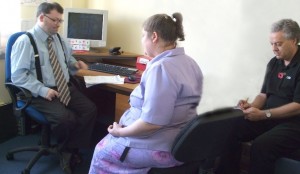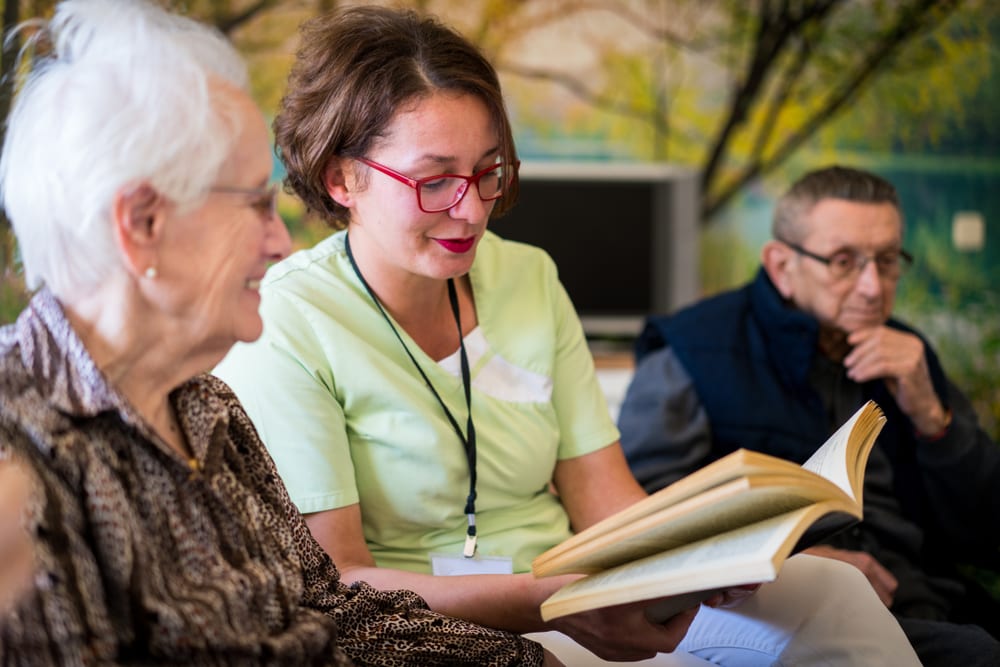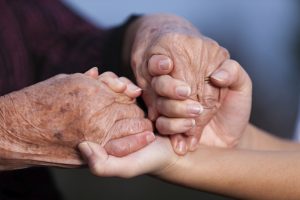
Val Williams discusses research around support for disabled people
Social practices can be enabling or disabling
Imagine you are the woman in this picture, a patient going to your doctor to talk about symptoms you’ve been having. The patient here is a disabled woman who is sitting directly in front of the doctor, with her personal assistant taking notes for her, out of the doctor’s direct line of sight. This might seem a trivial thing, but going to the doctor might not always work so well for some disabled people. The doctor might talk exclusively to their carer or to a family member, instead of engaging directly with them. Or of course, they may not have a third party to help them remember what has been said. All these things are important when you want to get good health care, and they may require just a few changes in the way things are routinely done. Kerrie Ford, in the picture above, set up this scene back in 2010 as part of a training pack arising from a research study about support practices, in which she was a researcher.
Although disabled people might traditionally be seen as part of the problem, they can find their own solutions. For instance, in our research about support practices, disabled people suggested and developed ways of getting their messages across, to shift practices and to enable them to challenge inequalities. Disabled people have their own movement, which is now a global one, and have banded together to re-define some of the problems that confront them, and to redress the power imbalances that they face when professionals, practitioners and medical authorities dictate what is best for them. The most pressing issues are to find better ways to understand how to change disabling practices, while we listen to and work with disabled people themselves. Our new study is aiming to do just that. ‘Tackling disabling practices: co-production and change’ has been funded by the Economic and Social Science Research Council (ESRC) which I lead at the Norah Fry Research Centre at Bristol. Disabled people’s organisations, represented by ‘Disability Rights UK’ (DRUK) are joining with us to explore the ways in which we can understand and theorise change, in a way that really makes a difference to disabled people’s lives, on their own terms.
Disabled people of all ages experience inequalities in society, in every part of their lives. There is strong evidence that disabled people are often amongst the poorest, as the recent poverty survey carried out at the University of Bristol has revealed and that they face abusive or inadequate support practices in everyday settings (Antaki et al., 2007). Further Pauline Heslop and her team found that people with intellectual disabilities were dying prematurely, with men dying 13 years earlier than non-disabled men, and women some 20 years earlier. Health care is simply not adapting to meet the needs of all. In the UK, most of these problems are the subject of intensive investigation, resulting in legal and policy reform. For instance, in 2011, a Panorama television documentary exposed the abusive treatment being perpetrated against people with intellectual disabilities in an ‘assessment and treatment unit’. Following this, that particular hospital was closed down and a Government Concordat was signed in 2012, which pledged a reduction in hospital placements for people with intellectual disabilities and ‘the closure of large-scale inpatient services’. Support was also provided for commissioners and practitioners in the form of workforce development, guidance and toolkits to ensure better practice. However, in 2014, a further report acknowledged that:
For decades people have argued for change and described what good care looks like, and how we can commission it….. but the problem remains. Why? (Bubb, 2014: 17)
The conclusion in the 2014 report is that we do know ‘what good looks like’, and indeed we also know how to get there, but that it is simply too easy to ‘do the wrong thing’. Yet again, a further series of recommendations ensued, which invoke the rights of disabled people and their families to better community services, along with a system for holding local authorities and other agencies to account.
Why then are some practices so difficult to shift? Our new project starts in April 2015, and aims to interrogate the turn towards ‘practice’ in social science, in order to see what it can offer to our understanding of what is going on in practice and how the goings-on could be malleable, could be shifted, and maybe made more productive. We do not want to demonize those who are there to provide health and social care support. Indeed, we know that all of us could be inadvertently discriminating against disabled people by the way things are set up – even in our own Higher Education institutions. One of the strands of research in our new project is being led by Sheila Trahar in the Graduate School of Education, to explore the experience of disabled students, from their own point of view, while Sue Porter will lead on research about the experience of disabled academics. Other strands will be led by Beth Tarleton, building on the ‘Working Together with Parents Network’ working with Nadine Tilbury, Danielle Turney and Professor Elaine Farmer, to analyse how to achieve better support for parents with intellectual disabilities; by Pauline Heslop, who examines reasonable adjustments in healthcare provision; and by Val Williams and David Abbott, who build on the approach to micro-analysis of interaction (Williams, 2011) collecting videos and recordings of what goes on between support workers and disabled people. All our research work in this project is about how we can make a difference, and how we can theorise those changes in a way that is useful for social science and for disabled people themselves. Therefore Bernd Sass at Disability Rights UK is central to everything, and in the research strand based at DRUK will be taking forward the notion of ‘user-driven commissioning’ to see how disabled people’s own actions can have an effect on changing local authority and health care structures.
We are particularly pleased that our ESRC project is based on several partnerships. Not only is the DRUK a key partner, but the project will also include Professors Charles Antaki from Loughborough University, Celia Kitzinger from the University of York, Chris Hatton from the University of Lancaster, Alan Roulstone from Leeds, Dr Stanley Blue from Manchester, and Sue Turner from the National Development Team for Inclusion (NDTI), as well as Professor Andrew Sturdy from our own Department of Management at Bristol. We are working with experts across the disciplines, who have different ways of conceiving of practice – from the high level policy and strategic decisions made by government, to the micro-detail of front-line support offered to disabled people. Instead of pointing fingers of blame at particular individuals or institutions, we want to find out more about how to understand social practices, so that we can enable them to change.
Val Williams is Reader in Disability, Policy and Practice in the Norah Fry Centre the School for Policy Studies
References
Antaki, C, Finlay, W.M.L., Jingree, T and Walton, C.(2007) “The staff are your friends”: conflicts between institutional discourse and practice. British Journal of Social Psychology, 46, 1-18.
Bubb, S. (2014) Winterbourne View – Time for Change. http://www.england.nhs.uk/wp-content/uploads/2014/11/transforming-commissioning-services.pdf
Heslop, P. et al. (2013) Confidential Inquiry into premature deaths of people with learning disabilities (CIPOLD): final report. http://www.bris.ac.uk/cipold/
Williams, V. (2011) Disability & Discourse: analysing inclusive conversations with people with intellectual disabilities. Wiley-Blackwell.






